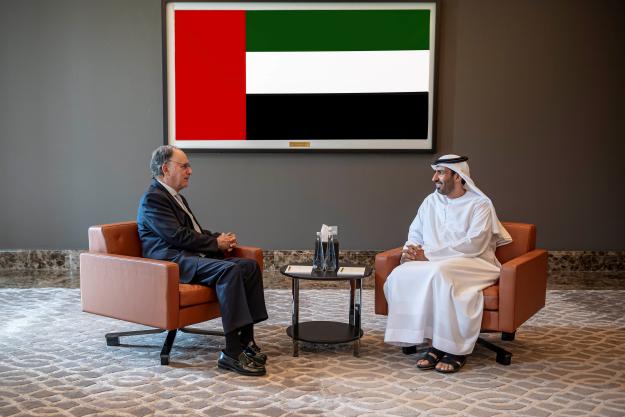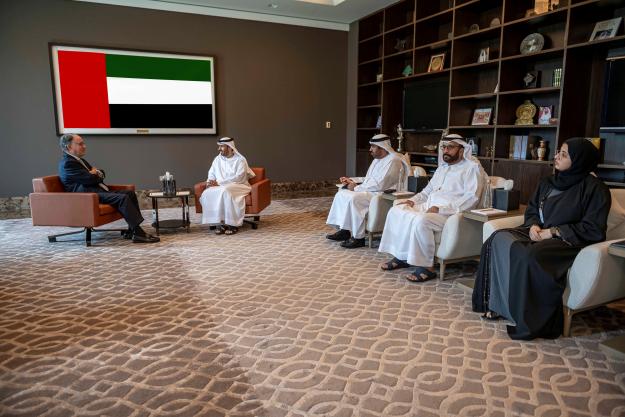
OPCW Director-General Fernando Arias (Left) and UAE Assistant Minister of Foreign Affairs, H.E. Mr Sultan Al Shamsi (Right)
THE HAGUE, Netherlands—21 September 2023—The Director-General of the Organisation for the Prohibition of Chemical Weapons (OPCW), Ambassador Fernando Arias, met with senior officials of the United Arab Emirates (UAE) during his visit to the country from 12 to 15 September 2023.
The Director-General met with the UAE’s Assistant Minister of Foreign Affairs, H.E. Mr Sultan Al Shamsi. The two officials reviewed progress in the implementation of the Chemical Weapons Convention (CWC) and discussed opportunities as well as challenges for the OPCW in the current international security environment.
“Achieving the end of destruction of all declared chemical weapons stockpiles in July this year was a major milestone for the OPCW and its Member States,” the Director-General said. “However, our work is not done yet. Recent uses and threats of use of toxic chemicals as weapons illustrate that preventing re-emergence will remain a priority for the Organisation.”
Ambassador Arias further underlined that “rapid advancements in science and technology present both threats and opportunities for chemical security worldwide. The OPCW Centre for Chemistry and Technology is an important tool for the Organisation to keep pace with technological developments to tackle current and emerging challenges.”
“The new facilities of the Centre also enable the Organisation to provide advanced trainings for Member States experts in chemical emergency preparedness,” he added.

The Director-General also met with senior officials at the UAE’s Ministry of Interior, the National Emergency Crisis and Disaster Management Authority, the Civil Defense Academy, the Executive Office for Control and Non-Proliferation and the Dubai Civil Defense. During these visits, Ambassador Arias was briefed by UAE authorities on various activities and efforts related to the implementation of the Chemical Weapons Convention.
H.E. Mr Talal Al Teneiji, the Director-General of the Executive Office for Control and Non-Proliferation of the Ministry of Foreign Affairs, the Head of the National Authority of the UAE, highlighted the importance of the role of the OPCW and its contributions to advancing global peace and security through addressing the use of chemical weapons and completing the destruction of all declared chemical weapons stockpiles under its verification regime.
“The UAE has been committing to the Chemical Weapons Convention and supporting the work of the OPCW. The visit of the OPCW Director-General to the UAE reflects the close and continuous cooperation between our country and the Organisation,” said Mr Al Teneiji.
“The UAE has issued all necessary legislation required under the Convention, which supports the implementation of the Convention on a national level. In addition, we are working closely with the OPCW in organising conferences and workshops on topics relevant to the CWC. Most recently, we organised a workshop on chemical safety and security in February this year. The workshop was attended by participants from Asian OPCW Member States and aimed at promoting peaceful uses of chemistry,” he underlined.
Background
The United Arab Emirates (UAE) has been an active member of the OPCW since 2000. To date, the UAE has made one voluntary contribution of EUR 100,000 to the Trust Fund for a Centre for Chemistry and Technology.
The ChemTech Centre, which was inaugurated on 12 May 2023, enhanced the OPCW’s ability to conduct chemical research and analysis. This significantly reinforced its verification regime and inspection capabilities of chemical industries around the world. In addition, an increasing number of capacity development activities are being delivered through the Centre, including chemical emergency response trainings and analytical skills development courses for experts from Member States.
As the implementing body for the Chemical Weapons Convention, the OPCW, with its 193 Member States, oversees the global endeavour to permanently eliminate chemical weapons. Since the Convention’s entry into force in 1997, it is the most successful disarmament treaty eliminating an entire class of weapons of mass destruction.
The OPCW observed the destruction of the chemical weapons stockpiles declared by all State Parties to the Chemical Weapons Convention and confirmed on 7 July 2023 that all declared chemical weapons stockpiles were verified as irreversibly destroyed.
For its extensive efforts in eliminating chemical weapons, the OPCW received the 2013 Nobel Peace Prize.
